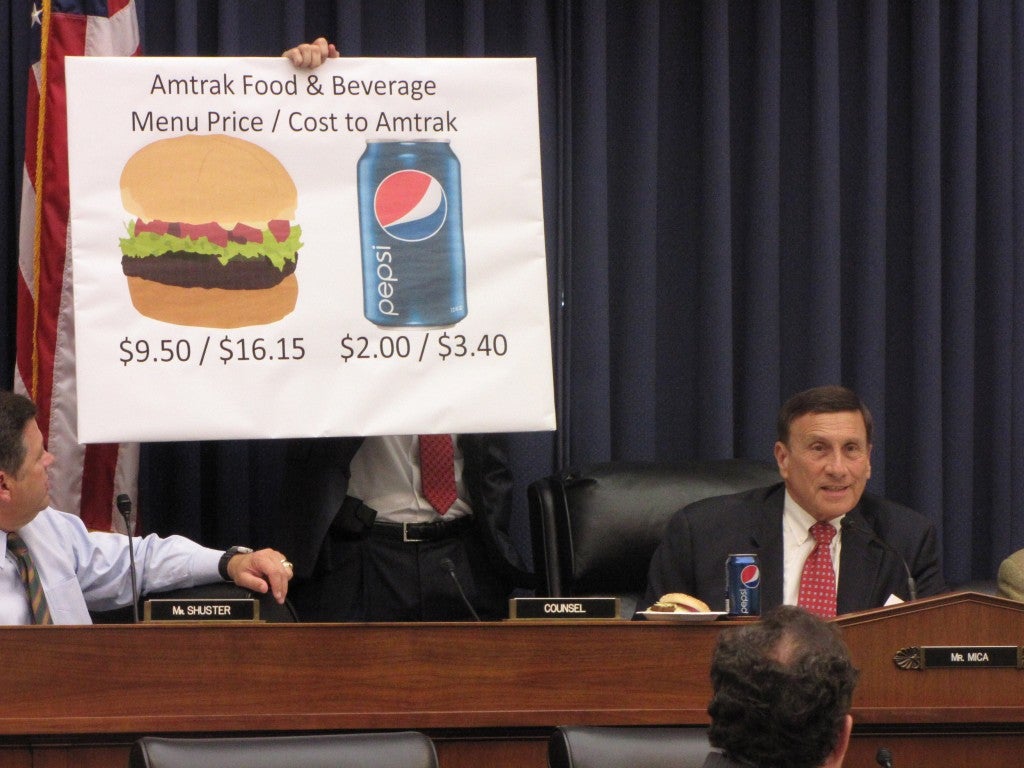Amtrak Records $834 Million Loss on Food Sales Over Past Decade
Michael Sandoval /
Amtrak spent $1.70 for every dollar it earned on food and beverage sales last year, leading to a loss of $84.5 million on the service, according to information provided to the House Transportation and Infrastructure Committee this week.
Committee Chairman John Mica (R-FL) blasted the “inefficient and wasteful” record of the nation’s rail line, pointing out the substantial cost to taxpayers occurring with each transaction.
“Over the last 10 years, these losses have amounted to a staggering $833.8 million,” said Mica. “It costs passengers $9.50 to buy a cheeseburger on Amtrak, but the cost to taxpayers is $16.15. Riders pay $2 for a Pepsi, but each of these sodas costs the U.S. Treasury $3.40.”
Mica estimated the per-employee loss on Amtrak’s food and beverage service—approximately $85 million—at a whopping $68,476. Amtrak employs 1,234 in its concessions service. The division collected $121.4 million in revenue but recorded a loss of $206 million.
Congress has required Amtrak’s food and beverage services to be revenue positive since 1981. Since 1999, Amtrak has contracted out the management and logistics of the division, but sales remain within the domain of Amtrak employees. The sale of food and beverages aboard Amtrak trains has not broken even—once.
The losses revealed Thursday are no surprise, according to previous reports from both Amtrak’s inspector general and the U.S. Government Accountability Office. The Amtrak OIG report from June 2011 detailed $61 million in losses recorded by the food and beverage service in fiscal year 2010. It also noted that Amtrak had not made significant progress on “long-standing internal control weaknesses and gaps that continue to make on-board food and beverage revenues and inventories vulnerable to fraud, waste and abuse.”
Among other findings, the OIG report estimated that between $4 million to $7 million of the sales could be at direct risk of theft. Other examples of waste, fraud, and abuse cited by the report included inflating first-class meal checks (the meals in first-class are free) and selling the items to other passengers for cash, shorting cash register sales, and stealing inventory.
Efforts to reform and improve the food and beverage service would provide only cosmetic benefits, compared to the staggering annual losses and the requirement that Amtrak prevent losses that have added up to almost $834 million in just one decade.
Amtrak President and CEO Joseph H. Boardman touted the improved “financial efficiencies” within the food and beverage services. Amtrak’s goal, Boardman said in prepared testimony, is to recover 70 percent of costs associated with providing food and beverages on all trains by 2015.
Boardman defended the food and beverage service as a revenue enhancer that bolstered Amtrak’s business model.
“Part of what attracts people to Amtrak services is the availability of food, and the manner in which it is offered. If we were to eliminate food and beverage services, we would actually lose more money, because of the loss in associated ticket revenue,” wrote Boardman. Boardman makes a point, but this does not obscure the red ink staining Amtrak’s budget ledger – either with this particular service or with respect to its overall operations.
Mica expressed disappointment at the lack of progress in returning the Amtrak service to profitability, and eliminating the cost to taxpayers.
“Unfortunately, this outrageous cost to hard-working Americans continues. These losses have been mounting for each of the last three years. What makes this more astonishing is that Amtrak food and beverage service is legally obligated to operate on a breakeven basis. Despite this requirement… Amtrak has still lost over three-quarters of a billion dollars in the last ten years,” Mica said. “We have to end these unbelievable losses to the taxpayers.”
President Obama would double down on spending on Amtrak, despite it being a chronic money-loser. That kind of irresponsible spending cannot continue, nor can we justify asking taxpayers to keep subsidizing Amtrak, especially when its service makes up less than one-half of one percent of interstate passenger travel. These particular food and beverage service losses only underscore that reality.

